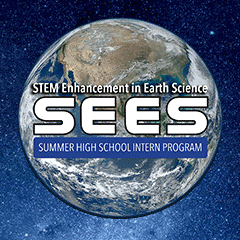GLOBE News
U.S. GLOBE Sophomores/Juniors: 2023 Summer Internship Opportunity – Deadline 15 March

The United States GLOBE Coordination Office is accepting applications for a GLOBE intern at the STEM Enhancement in Earth Science (SEES) 2023 Summer High School Intern Program. This opportunity is ONLY open to current Sophomores and Juniors who are GLOBE students. Application deadline is 15 March.
Selected interns will learn how to interpret NASA satellite data and work with scientists and engineers at the University of Texas at Austin Center for Space Research.
For more information on this internship opportunity, click here; however, USE the directions below to apply through U.S. GLOBE.
HOW TO APPLY:
Submit your online application by 15 March 2023. The application includes essay questions that you must answer as part of the application. (You may wish to answer the questions on a separate document and then cut and paste your answers into the online application.)
ESSAY QUESTIONS: Your essay question response should not exceed 1250 words (use 250 words per question as a guideline). Describe yourself and discuss each of the following as part of your essay. You are not limited to these areas.
- What do you expect to gain from the SEES internship?
- Share any important academic or life experiences in STEM (science, technology, engineering and mathematics).
- Extracurricular activities that have influenced you in a positive way (include skills you deem valuable for an academic team research setting).
- Your current academic path and career plans.
- How will your experience in this program impact your plans for the future?
You must include in the application the name and email address of a GLOBE teacher who will submit your letter of recommendation.
Prepare a short introduction video sharing:
- who you are;
- where you are from;
- and how GLOBE activities have influenced you in a positive way, or given you skills that are valuable for an academic team research setting.
SUBMITTING A VIDEO: When submitting a video, remember that you are submitting a link (URL) to your video (such as on YouTube.com, youku.com, tudou.com, some other video hosting site, or your own website), not the video itself.
Do not secure your video with a password. Instead, it recommended that you make the video unlisted. The following descriptions apply to YouTube.com, but should be applicable to other video hosting sites. YouTube has three privacy settings: Public, Private, and Unlisted.
- Public means anybody can find it and view it. Do not use this option.
- Private means it can only be seen by the you, and the people you select. The video doesn't appear in your channel or in search results. Viewers you select must have a Google account to log in and see the video, and the you must also know to whom to grant permission. Do not use this option.
- Unlisted means that anybody who has the link can view the video, but it doesn't appear in your channel or in search results. Use this option.
Please email your video link URL to Jennifer Bourgeault at usglobecc@gmail.com with the words “SEES Intern Video 2023” and your last name in the subject line by 15 March.
Note from the University of Texas (UT) at Austin
Each intern selected will receive links to virtual SEES distance learning activities on or about 01 May. Required activities must be completed by 25 June or students will not be eligible to participate in the internship and an alternate will be accepted in their place. Both on-site and virtual interns will work with NASA subject matter experts in July 2023.
The residential internship is for two weeks. Interns must be on-site at The University of Texas Center for Space Research, West Pickle Research Center, Austin, Texas, from 08-22 July 2023 if the pandemic allows. Each virtual project has a different timeline. Please review the project description in the application for additional details.
All interns will participate in a virtual SEES Science Symposium 24-26 July 2023 where teams will present their research to NASA, scientists, family members and invited guests.
News origin: GLOBE Implementation Office





